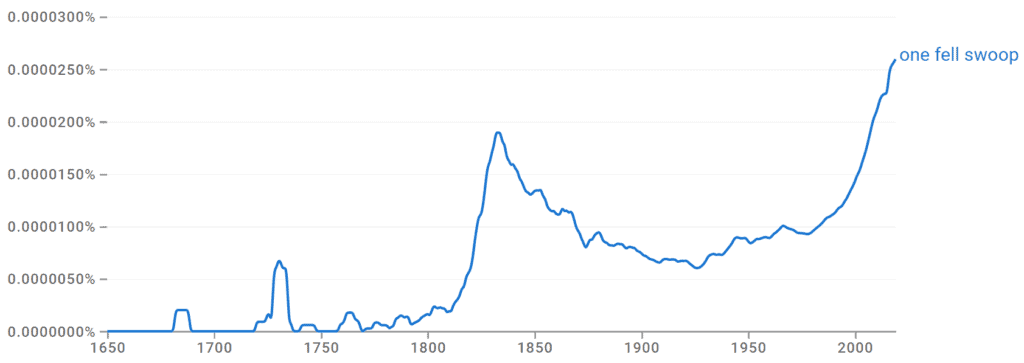Idiomatic phrases are an excellent addition to speech and writing to provide colorful analogies and explanations. But, unless your audience understands the reference you are making, you could create confusion.
Idioms are used to provide a figure of speech rather than a literal definition. Many idioms come from a literal use but incorporate words that are no longer part of mainstream English—which can end up being quite confusing.
One fell swoop is a great example of this. This phrase was first used over 400 years ago and is still a part of the English vernacular. Let’s learn where it came from and how to incorporate it into your work.
What Does One Fell Swoop Mean?
To do something in one fell swoop is to do it suddenly or in a single, swift action.
The use of the word fell in this context is an adjective, meaning fierce, savage, cruel or ruthless. This sense of fell is archaic and comes from the 13th century, and is not often seen in the English language outside idiomatic references.
Swoop is used as a noun in this idiom, referring to a blow or stroke, or may be used in a metaphorical manner to describe a bird’s sudden, sweeping descent from a height.
One Fell Swoop Sentence Examples
- Had the committee listened respectfully, asked for clarity, and then addressed the manner, they may have put all concerns to rest in one fell swoop. However, they chose to ignore the complaint forcing the public to file a grievance against them.
- Going to a big box store that offers all you need under one roof may not be everyone’s cup of tea, but it allows you to complete all your shopping in one fell swoop.
- If you want to save time and avoid late work, get your outline and essay planning done in one fell swoop so all you have to worry about is your final draft.
One Fell Swoop, One Foul Swoop or One Fowl Swoop?
Some people misuse the idiom, saying one foul swoop instead of one fell swoop. Foul is usually meant to imply that something is evil or offensive, and although the phrase would make sense in this context, it is incorrect and generally assumes a misspelling of the proper phrase.
Unlike foul swoop, one fowl swoop makes no sense whatsoever. A fowl is a bird of any kind and does not work to create an understandable phrase.
What Is the Origin of One Fell Swoop?
The etymology of one fell swoop surrounds the word swoop, an older word first used in the 1540s to describe a “blow or strike” from Old English swapan, meaning “to sweep, brandish or dash.”
The earliest documented instance of one fell swoop is from Shakespeare’s Macbeth (1605):
All my pretty ones?
Did you say all? O hell-kite! All?
What, all my pretty chickens and their dam
At one fell swoop?
Here, Shakespeare clearly means swoop to describe a raptor’s sudden, swift descent upon its feathered prey and uses it to create an allusion to the violence brought upon MacDuff’s family.
Let’s Review
The idiom one fell swoop is used to describe a hit or strike done violently and quickly when used in a literal sense. When applied figuratively, it highlights a sudden and swift action that has been taken.
The words fell and swoop are both old in their usage. Fell was once used to mean a savage or cruel action, while swoop defined a hard hit. Their modern use is much different, but their origins are kept alive within the idiom, one fell swoop.



Comments are closed.